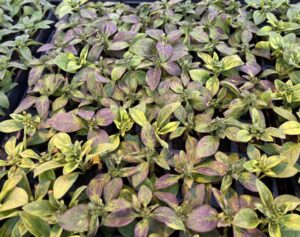Greenhouse education at Great Lakes EXPO
Education sessions are just one of many reasons greenhouse growers attend the Michigan Greenhouse Growers Expo, which is held during the Great Lakes Fruit, Vegetable & Farm Market EXPO, and this year’s lineup will feature a number of opportunities. Among them, growers will have the opportunity to learn about proper greenhouse lighting during propagation, as well as ways to increase customer engagement to boost plant sales.
Erik Runkle and Roberto Lopez – Greenhouse Lighting During Propagation
Erik Runkle, professor in the department of horticulture at Michigan State University (MSU) and Roberto Lopez, associate professor in the department of horticulture at MSU, will present a session together, “Greenhouse Lighting During Propagation,” at the Great Lakes EXPO.
Their area of focus includes growing plants in controlled environments, including indoors and in greenhouses. Runkle and Lopez will discuss lighting during propagation in their session with an emphasis on greenhouse production.
“When we talk about lighting, we think about four parameters. These consist of light intensity, light quality, photoperiod and the uniformity of light,” Runkle said.
Runkle and Lopez will explain those four parameters detailing what they are, why they are important in the production of young plants and how growers can utilize them to increase the success of propagation.
Temperature, light and humidity all play a vital role in the rooting process. If one of these components is out of balance, this could potentially delay the rooting process and how long cuttings are in the greenhouse, according to Lopez.
“However, recently, growers have been reporting chlorosis and purpling of some species under LED supplemental lighting,” Lopez said.

Lopez and his team researched this undesirable change in foliage color and determined it was primarily caused by temperature. During the session, both Lopez and Runkle will discuss the proper procedures to prevent the purpling and why, specifically, this can happen.
“If you can afford it, provide supplemental lighting during the winter, on cloudy days and at night,” Lopez said. “That is going to reduce your propagation time, lead to higher-quality liners and plugs and save you money.”
Overall, Lopez says the ideal propagation environment has supplemental lighting, root zone heating or bottom heating and can control vapor pressure (humidity).
Alicia Rihn
Alicia Rihn, assistant professor in the department of agricultural and resource economics at the University of Tennessee, focuses on consumer behavior, willingness to pay and perceptions of specialty crops and niche products. Rihn’s current research includes plant benefit information, alternative pest control methods, native plant perceptions, e-commerce, and point-of-sale data.
Rihn will present in two sessions during the Great Lakes EXPO. In her first session, “Plants are Experiential Goods — Ways to Increase Customer Engagement and Boost Sales,” Rihn will discuss how plant purchasers’ perceptions have evolved and explain specific strategies to engage consumers through marketing.
“Traditionally, plants were viewed as luxury goods. This perception has changed, and plants are viewed as more experiential,” Rihn said. “As new customers enter the marketplace, the value proposition is changing and there is a need to alter marketing communications to better engage with the new customer.”
During Rihn’s second session, “Leveraging Native Plants to Boost Sales,” attendees will learn about “recent research addressing consumer perceptions of native plants, how those perceptions influence sales and applications for marketing strategies to engage customers,” according to Rihn.
“In recent years, consumer demand for native plants has taken off,” Rihn said. “Historically, people view native plants as great for handling difficult landscapes where not all plants thrive. This perception has changed and homeowners are using native plants throughout their landscapes.”
Rihn gives ‘top tips’ for growers looking to increase plant sales, including assessing your company’s value proposition and how that is communicated with customers, plus identifying opportunities to highlight why your products are better when compared to non-horticulture alternatives.
“Many customer groups are actively seeking products aligning with their values and will spend more on those items,” Rihn said. Our industry is in a great position to highlight the environmental and aesthetic benefits of our products. Leverage their impact by providing information at the point of sale and through online platforms. Be present and active where your customer groups are and assess opportunities to engage these groups.”
To increase customer engagement, Rihn suggests resonating with your audience and investing in your overall online presence.
“We are seeing a boom in young families with young children,” Rihn said. “Embrace your inner child to resonate with these folks. Provide examples demonstrating product use and the potential benefits of buying that product. For example, demonstration gardens with spaces to linger invite people to take a breath and consider opportunities.”
To learn more about this session and others visit www.glexpo.com. The 2023 Great Lakes EXPO will be held Dec. 5-7 at DeVos Place in Grand Rapids, Michigan.


 Video Library
Video Library 




















